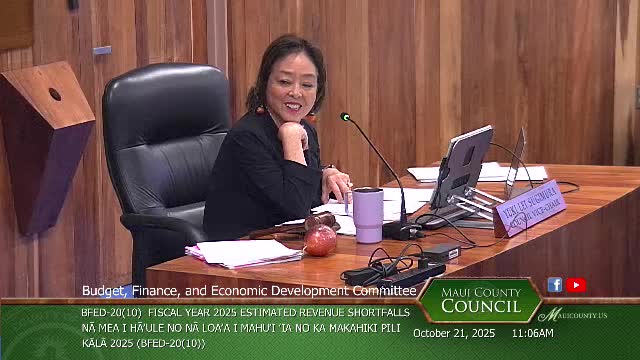Finance and departments brief committee on FY25 estimated revenue shortfalls; GASB 101 and delinquent sewer accounts cited
Get AI-powered insights, summaries, and transcripts
Subscribe
Summary
Department of Environmental Management and Finance told the committee that an estimated FY25 sewer revenue shortfall and new GASB accounting for sick‑leave liabilities contributed to budget adjustments; delinquent sewer receivables and collection efforts were also discussed.
County finance and department staff briefed committee members on estimated fiscal‑year 2025 revenue shortfalls in utility funds and other budgetary reallocations.
Why it matters: Budget shortfalls and accounting changes can affect cash flow, fund reserves and the timing of transfers between countywide appropriations and department budgets. Committee members sought clarification about the causes, whether transfers were one‑time or recurring and what remedies the administration is pursuing.
Department of Environmental Management Director Shane Agawa and Deputy Finance Director Marcy Martin explained that an estimated FY25 shortfall in the sewer fund was reported earlier in May and that lower wastewater revenues (linked to reduced water use) contributed to the gap. Agawa also told the committee the department is working with the Department of Water Supply to pursue collections; the most recent figure discussed during the meeting was about $11.59 million in delinquent sewer accounts as of May 31, 2025, including several large balances.
Deputy Director Maria Zelensky and finance staff explained that a portion of the adjustment for the water fund reflected a new Governmental Accounting Standards Board standard (GASB Statement 101) that requires certain sick‑leave liabilities to be recognized as expenditures and liabilities at fiscal‑year end. Finance staff said this accounting recognition increased FY25 expenditures after June 30 and that staff used countywide appropriations and general‑fund transfers allowed under county budget provisions to cover the adjustments rather than seeking a supplemental appropriation.
The Department of Water Supply reported two identified adjustments: roughly $42,273 for unbudgeted debt‑service due to additional state revolving loan fund drawdowns, and $206,088.73 related to unbudgeted engineering personnel salary increases and GASB 101 compensated‑absence recognition. Finance staff described the transfers used to cover those amounts and said they were done under existing budget provisions; no supplemental transfer was required.
Committee members asked about whether the GASB‑related entries represent a recurring budget pressure. Finance staff said the GASB change was a one‑time recognition for FY25 but that departments are taking steps to calculate and budget for the new liability going forward. Water staff said they plan to calculate sick‑leave accruals and finalize adjustments by December so future years can be budgeted to avoid similar shortfalls.
Members also asked about collections and enforcement for delinquent sewer accounts. Department staff said letters have been sent and that water fiscal has the ability to lock meters or stop service as a strong compliance tool; the county does not currently assess penalties for delinquent accounts but has been discussing adopting fine policies.
The committee took no formal action on the briefing but directed staff to post the written responses circulated during the meeting and to continue follow‑up with department finance staff on ongoing collection efforts and on the plans to budget for GASB‑driven liabilities in future fiscal years.
